Local
Choi trial halted after challenge to judge’s ruling
Preliminary evidence shows ‘vindictive prosecution’
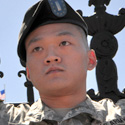
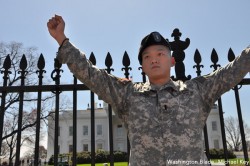
Former Army Lt. Dan Choi and 12 others were arrested last year after protesting ‘Don’t Ask, Don’t Tell’ at the White House. (Blade file photo by Michael Key)
A federal judge on Wednesday suspended the trial of gay former Army Lt. Dan Choi after the prosecutor said she would challenge his preliminary finding that sufficient evidence exists that Choi was targeted for “vindictive prosecution” in connection with a White House protest last November.
Choi and 12 other activists were arrested Nov. 15 for handcuffing themselves to the White House fence to protest the “Don’t Ask, Don’t Tell” law. Choi faces a possible sentence of six months in jail or a $5,000 fine if convicted on a misdemeanor charge of disobeying a lawful order to disperse from the fence.
In a tense exchange between U.S. District Court Magistrate Judge John Facciola, prosecutor Angela George announced she would file a request for a writ of mandamus or legal challenge before the court’s chief judge to contest Facciola’s decision to allow Choi’s attorneys to pursue a vindictive prosecution defense.
Facciola responded by saying he would suspend the trial for 10 days to give George, an assistant U.S. Attorney, time to prepare a motion for a writ of mandamus and to provide Chief Judge Royce Lamberth time to consider it.
William Miller, a spokesperson for the U.S. Attorney’s office, confirmed that George would seek the writ of mandamus from Lamberth. But he declined to comment further on the matter, saying his office never comments on pending cases.
If Lamberth grants the request, legal observers say Facciola would likely be directed not to allow Choi’s attorneys to pursue a vindictive prosecution defense. Should he turn down the request, Facciola would be free to allow the vindictive prosecution defense to move forward.
Such a defense would allow Choi’s attorneys to pursue documents and subpoena witnesses that Choi’s supporters say could possibly link the alleged effort to go after Choi for a harsher prosecution to higher-level government officials, including officials at the White House.
Defense attorney Robert Feldman called Facciola’s finding that the defense presented a “prima facie case” that a vindictive prosecution occurred a “vindication” of Choi’s longstanding contention that his arrest and prosecution violated his constitutional right to free speech.
The clash between George and Facciola came on the third day of the trial and one day after Choi testified for more than two hours as the lead witness for his own defense, saying he was exercising his First Amendment right to free speech at the White House protest.
In response to Feldman’s questions, Choi testified at length about his role as a civil rights activist for LGBT people and for gays in the military. He told how he models his actions on the black civil rights movement of the 1960s, including the famous lunch counter sit-ins at a Woolworth’s department store in Greensboro, N.C., that challenged segregation laws.
Choi testified that a series of three White House protests against the “Don’t Ask, Don’t Tell” law on gays in the military, in which he and other activists were arrested at the White House fence, were based on the same principle used in the black civil rights movement for exercising a constitutional right of free speech.
“I believe that was a transformative moment,” he said of the White House protests.
George objected repeatedly to Choi’s dialogue on civil rights, saying it was not relevant to the case at hand. To the amazement of some courtroom observers, Facciola overruled her objections almost every time she raised them.
In her cross-examination of Choi, George pressed the former Army officer, West Point graduate and combat veteran in the Iraq war to respond to the charge that he disobeyed a lawful order to disperse from the White House fence.
Choi responded by citing a provision in U.S. military law pertaining to unlawful orders.
“If you are given an order that is unlawful or immoral, it is your duty to disobey that order,” he said.
Feldman and defense co-counsel Norman Kent told reporters covering the trial that Choi’s defense is based, in part, on the premise that prosecutors singled him out for a harsher prosecution when they charged him with violating a federal regulation pertaining to White House protests and demonstrations along the White House fence and sidewalk.
The federal regulation carries a penalty of six months in jail and a possible $5,000 fine. The two attorneys said people arrested in virtually all other White House demonstrations in recent memory – including Choi and other activists in similar protests in April and May of 2010 – were charged under a D.C. municipal ordinance they compare to a traffic violation that carries no prison sentence.
In his testimony on Tuesday, Choi said he believes prosecutors decided to invoke the far more harsh federal regulation against him in the Nov. 15, 2010 case, which he now faces at trial, because of his role as a gay former military officer who is “standing up for my beliefs.”
Choi stated in his testimony that thousands of people appeared to have violated the same regulation with which he was charged when they gathered at the White House earlier this year to celebrate President Barack Obama’s announcement that accused terrorist Osama bin Laden had been killed in a U.S. military operation in Pakistan.
Choi and his attorneys noted that dozens of the revelers that evening clung to the White House fence and did not move back and forth along the sidewalk, as required under the ordinance for a demonstration, when they cheered and expressed support for the president’s role in bin Laden’s capture and death.
By not attempting to disperse or arrest the throngs that congregated at the fence on that occasion while they arrested Choi and other protesters for challenging Obama on his handling of the “Don’t Ask, Don’t Tell” law shows that Choi was singled out for “vindictive” prosecution, Choi’s attorneys argue.
Choi and his attorneys also argue that the ordinance that Park Police used to arrest Choi violates the 1969 U.S. Supreme Court decision Shuttlesworth v. Birmingham. The decision overturned a Birmingham, Ala., law used by police there to arrest a civil rights protester in 1963 for demonstrating without a permit on grounds that the law was used to stifle his constitutional right to peacefully parade in a civil rights protest.
In anticipation of Choi’s vindictive prosecution defense, the government filed a motion last Sunday, one day before the trial opened, arguing that rules established by previous court decisions require a vindictive or “selective” prosecution defense to be introduced prior to the start of a trial. The 14-page motion argues that such a defense cannot be introduced during a trial and that Choi’s defense team failed to introduce the defense before the trial started.
Facciola did not rule on the motion at the start of the trial, saying he would do so as the trial progressed to first determine whether Choi’s attorneys would move forward with that defense.
When questioned by George during the trial on Wednesday, Facciola said he chose to reject the government motion on grounds that prior decisions by appeals courts requiring a vindictive or selective defense to be introduced prior to trial applied only to jury trials.
Choi’s case moved forward as a non-jury trial similar to other misdemeanor cases involving alleged violation of regulations pertaining to protest demonstrations at the White House.
George’s announcement about the writ of mandamus came after Facciola appeared to side with arguments by the defense that the government singled out Choi for a harsher prosecution for his Nov. 15, 2010 White House protest.
They attracted national media attention when Choi and 12 other LGBT activists handcuffed themselves to the White House fence. About 75 supporters who assembled across the street in Lafayette Park cheered and chanted slogans for LGBT equality while Park Police removed the handcuffs with bolt cutters and placed Choi and the other protesters under arrest.
In May of this year, the 12 others who were arrested agreed to a government offer to plead guilty to the charge in exchange for the government dismissing the case against them in six months if the activists don’t get arrested during that period for any reason, including a similar civil disobedience protest.
Choi told reporters at a news conference outside the federal courthouse Monday, after the trial recessed for the day, that he rejected the government’s plea bargain offer because he believes the law and regulation used to arrest him is unconstitutional.
“I believe there is no law that, in the history of this country, abridges freedom of speech, assembly, or the right to protest for redress of grievances, which were clear and made plain by all of the defendants,” he said.
George called five Park Police officers and a U.S. Park Ranger as government witnesses on Monday. Under questioning from George, they testified that they had no intention of singling out the protesters for their political beliefs or because of their sexual orientation.
In his cross-examination of the officers, Feldman questioned the validity of their decision to charge Choi under the federal regulation rather than the less serious D.C. municipal statute.
Feldman released an e-mail sent to the defense on Friday by George that extended another offer for Choi to plead guilty to the charge in exchange for the dismissal of the case by the government if Choi refrained from getting arrested for the next four months.
Feldman said Choi responded by saying he would accept the offer only on condition that the government issue a public apology to Choi in court on Monday for the arrest and prosecution against him. Feldman said the government rejected the conditions, prompting Choi to turn down the offer.
A spokesperson for the U.S. Attorney’s office said the office would have no comment on the case while the trial is in progress.
Park Police Lt. Robert Lachance, who led a team of officers assigned to arrest the protesters, testified that an assistant solicitor general at the Department of Interior, which has jurisdiction over the Park Police, advised him that the act of chaining oneself to the White House fence violated a federal regulation against actions that pose a threat to public safety, obstruct traffic, and potentially prevent “emergency responders” from carrying out their work.
At the news conference, Feldman said he planned to argue at the trial that Choi’s action at the White House fence did not violate the regulation and statute cited by the Park Police and by prosecutor George.
“It’s uncontroverted that Lt. Choi is no threat to the public safety whatsoever,” said Feldman. “Neither does he obstruct traffic, which is the second part of the regulation.”
Feldman said he would also argue that the regulation used by authorities to arrest Choi applies only to the sidewalk next to the White House fence. He noted that Choi and the other protesters were standing on a masonry ledge that rises above the sidewalk and serves as an anchor for the White House fence.
“It’s very clear that my client was never on the sidewalk,” Feldman said. “He was on the masonry fence, which is above the sidewalk. And the warnings from Lt. Lachance said, ‘Get off the sidewalk.’ How can you get off the sidewalk if you were never on the sidewalk?”
He said he would also argue that Choi was unable to hear the warning that Lachance made to the protesters through a loudspeaker brought to the scene by Park Police. Lachance testified that he read a scripted message three times ordering the protesters to leave the fence and warning them they would be arrested if they did not comply with that order.
Feldman said Lachance’s warnings were drowned out by loud shouts and chants by Choi and the other 12 protesters handcuffed to the fence as well as by dozens of other protesters assembled in Lafayette Park.
The chants and shouts could be heard in a video recording of the protest that George played in the courtroom as part of a prosecution exhibit for the trial.
“There’s a cacophony of noise all around, and how can you possibly hear Lt. Lachance’s warnings to go away?” Feldman said at the news conference.
Gay activist and former military Capt. Jim Pietrangelo II testified on Tuesday as a defense witness, saying he observed first-hand what he believes were attempts by Park Police and government officials overseeing the police action an effort to single Choi out for a harsher charge based on Choi’s statutes as a gay former military officer and advocate for gays in the military.
Maryland
Silver Spring holds annual Pride In The Plaza
‘Today means inclusion. It means to build resilience’

Silver Spring’s annual Pride in the Plaza event took place on Sunday to celebrate the LGBTQ community and emphasize inclusion and resilience.
“Today means inclusion. It means to build resilience, love,” Robyn Woods, program and outreach director for Live In Your Truth, which organized the event, said. “I mean, just being surrounded by the community and so many great entrepreneurs, business owners, and just being a part of this whole rainbow coalition that we call the LGBTQIA to be about.”
With the event being her first time organizing for Live In Your Truth, Woods said she felt emotional to see the support and love at the event.
“Some people (are) bringing out their children, their babies, their grandparents,” Woods said. “It’s a lot more allies here than anything else. That type of support to me means so much more than just support from my community; just outside support, inside support, so much support around it, so much love. Everyone’s smiling outside, helping each other.”
Attendees of the event were able to head over to the Family Fun Zone, an air-conditioned Pride Cool Down Lounge, or watch live drag performances in the main stage area.
Along with entertainment and a shaved-ice stand, rows of information tables stood along the plaza, including FreeState Justice, the Washington Spirit, Trans Maryland, Moco Pride Center, and the Heartwood Program, an organization that offers support, therapy, education, and resources to the LGBTQ community.
“I want people to know about our services, and I love what we have to offer,” Jessica Simon, psychotherapist for Heartwood Program’s Gender Wellness Clinic, said. “I (also) want to be part of a celebration with the community, and so it feels good to be here with other people who have something they want to give to the community.”
She added that within today’s political climate, to which she called an “antidote to shame,” it’s important to be celebrating Pride.
“There’s a lot of demonization of LGBTQI people,” Siena Iacuvazzi, facilitator for Maryland Trans Unity, said. “(Pride) is part of the healing process.”
Iacuvazzi said she was taught to be ashamed of who she was growing up, but being a part of a community helped her flourish in the future.
“I was taught how to hate myself. I was taught that I was an abomination to God,” she said. “But being a community is like understanding that there are people who have experienced the same thing, and they’re flourishing. They’re flourishing because they’re willing to stand up for themselves as human beings and discover themselves and understand what’s true for themselves.”
She added that Pride allows for a mutual understanding to take place.
“It’s more of a sense of belonging … and just taking that home and understanding you’re not alone,” Iacuvazzi said. “We’re each taking our own journey — we’re not putting that on each other. It’s just walking away with a sense of belonging and humanity.”
Similar to Iacuvazzi, Woods said she hopes attendees’ biggest takeaways would be family, fun, resilience, and pride.
“Being proud of yourself, being happy for who you are, and representation and how much it matters,” she continued. “And I think all these young people that are walking around here get to see versions of themselves, but older. They get to see so many different lesbian, gay, bisexual, pansexual people that are successful, that are showing love, that care, and it’s not how we’re portrayed in the media. It’s lovely to see it out here. (It’s) like we’re one big old, happy family.”
Virginia
Spanberger touts equality, reproductive rights in Arlington
Democratic Va. gubernatorial nominee made campaign stop at Freddie’s Beach Bar
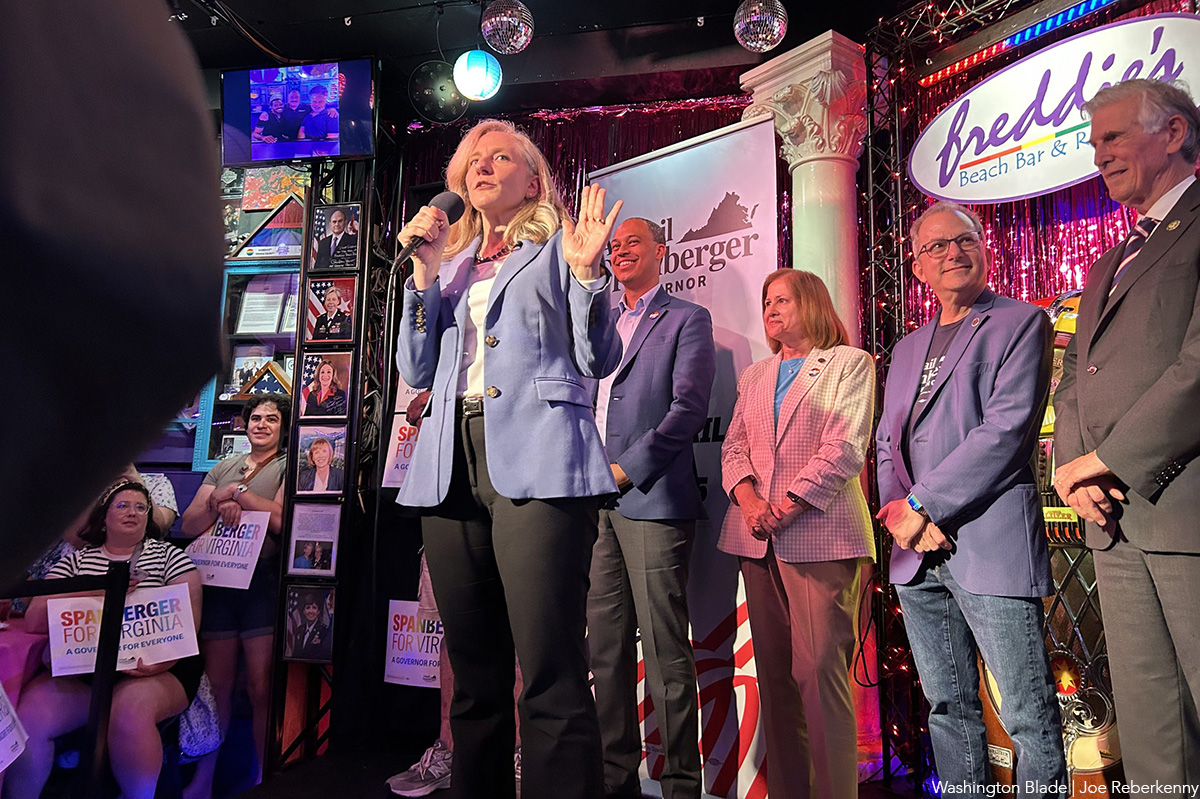
With the general election heating up and LGBTQ rights under increasing threat nationwide, Virginia gubernatorial candidate Abigail Spanberger brought her “Span Virginia Bus Tour” to Arlington’s Freddie’s Beach Bar for a campaign stop filled with cheers, policy pledges, and community spirit.
Spanberger, who served three terms in the U.S. House of Representatives from 2019 through early 2025 for Virginia’s 7th Congressional District, also served as a federal law enforcement officer specializing in narcotics and money laundering cases, and as a CIA case officer working on counterterrorism and nuclear counterproliferation.
Spanberger is running against Republican nominee Winsome Earle-Sears, the current lieutenant governor of Virginia, who said she was “morally opposed” to a bill protecting marriage equality in the commonwealth.
She was joined by other Democratic candidates and supporters: lieutenant gubernatorial candidate Ghazala Hashmi, attorney general candidate Jay Jones, Virginia state Sen. Adam Ebbin (D-Alexandria), and Congressman Don Beyer.
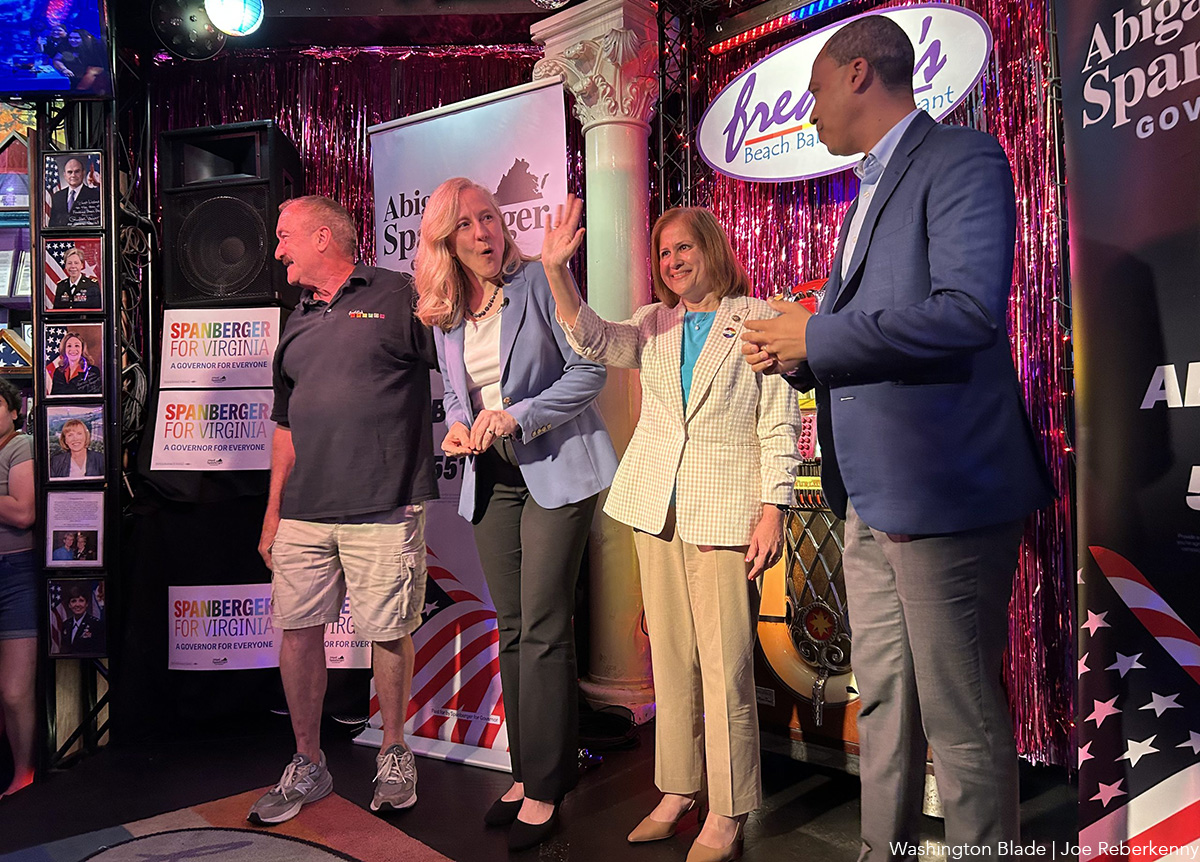
Freddie’s was packed wall-to-wall with supporters, many of whom wore “Spanberger for Virginia” shirts in the progressive Pride flag colors. In her speech, she made it clear that LGBTQ Virginians’ rights are on the ballot this year.
“I’m so excited to be here, and I am so grateful to the entire staff of Freddy’s for letting us overtake this incredible venue that is not just an awesome place to come together in community, but is a symbol to so many people of joy, of happiness, of community and of celebrating our friends and our neighbors,” Spanberger told the packed restaurant. “It is exciting to be here, and particularly during this Pride month, and particularly as we reflect on the 10-year anniversary of Obergefell and the reality that we still have so much work to do.”
“The reality is there are so many people who still would be inclined to take us backwards,” she said. “In this moment when we see attacks on people’s rights, on people’s humanity, on Virginia, on our economy, on research, on public education, on food security, on health care, on Virginians, on their jobs, on public service and on people — it can get heavy.”
“What it does for me is it makes me want to double down, because once upon a time, when I was talking to my mother about some horror show or sequence of activities coming out of a particular administration, she did not really have the patience to listen to me and said ‘Abigail, let your rage fuel you’ — and the conversation was over. And so I reflect on that, because, in fact, every day there is so much fuel to be had in this world and in this moment.”
One of the points Spanberger continued to emphasize was the importance of steadfast state government officials following the election of President Donald Trump, which has led to rollbacks of LGBTQ and bodily autonomy rights as a result of the conservative-majority U.S. Supreme Court.
“What the past few years have shown us is that a Supreme Court decision, no matter how many years we have celebrated its existence, does not protect us in the long term. And so as governor, I will work to make sure that every protection we can put in place for the dignity, the value, and the equal rights of all Virginians is a priority.”
During her speech, Spanberger highlighted several of the key values driving her campaign — protecting reproductive freedom and human rights, lowering healthcare costs, safeguarding Virginia’s environment, and ensuring that public education is affordable, accessible, and rooted in truth, not politics.
Spanberger went as far as to say that she wants to amend the state’s constitution to remove Section 15-A. “The reality is that in Virginia, we still have a ban in our state constitution on marriage equality. It is of the utmost urgency that we move forward with our constitutional amendment.”
“We will work to ensure that that terrible constitutional amendment, that was put in years ago, is taken out and updated and ensuring that Virginia is reflective in our most essential documents of who we are as a commonwealth, which is an accepting place that celebrates the vibrancy of every single person and recognizes that all Virginians have a place, both in that constitution and in law,” she added.
Following the event, two supporters spoke to the Washington Blade about why they had come out to support Spanberger.
“I came out because I needed to show support for this ticket, because it has been a particularly rough week, but a long few years for our rights in this country, in this state, with this governor, and it’s — we need to flip it around, because queer people need protection,” said Samantha Perez, who lives in Ballston. “Trans people need protection. Trans kids need protection. And it’s not gonna happen with who’s in Richmond right now, and we just need to get it turned around.”
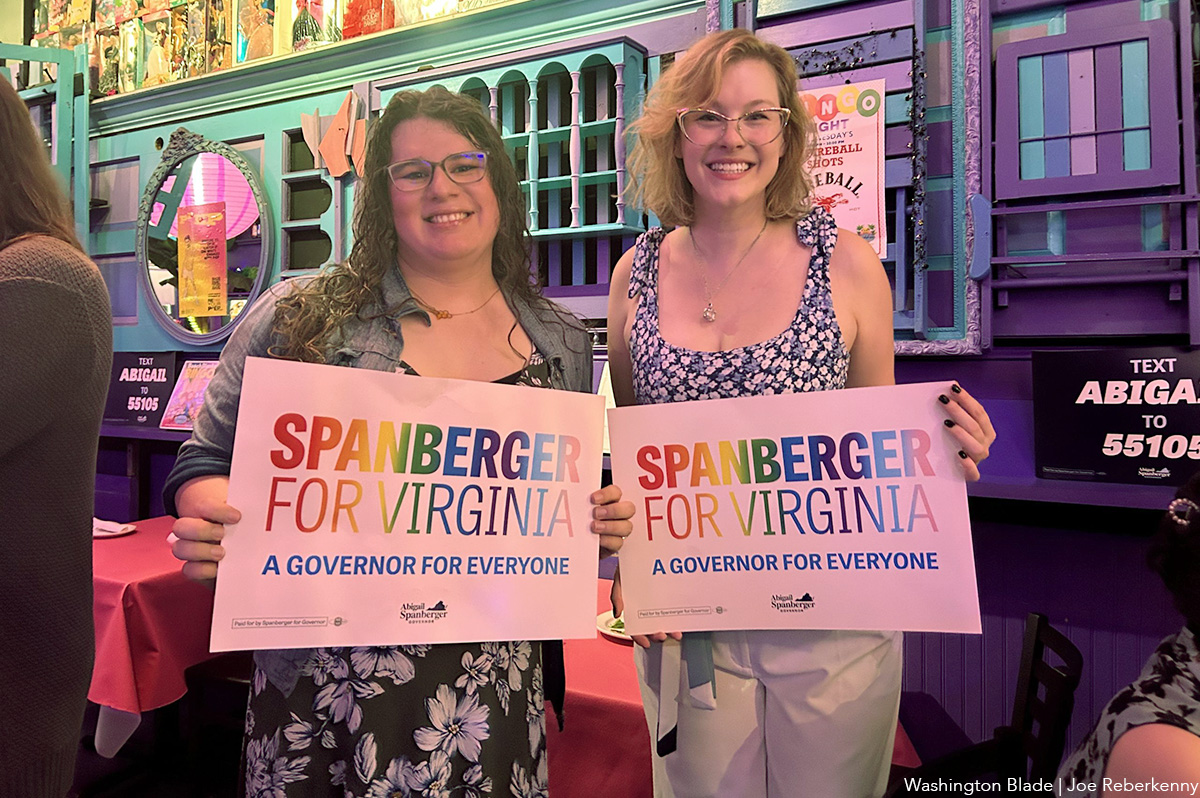
“The whole neighborhood’s here. All our friends are here,” said Annie Styles of Pentagon City. “It means the world to me to take care of each other. That’s what a good community does. That’s not what we’ve had with the Republicans here or across the nation for a really long time. It’s time to show that care. It’s time to make sure that good people are in a position to do good things.”
District of Columbia
Activists protest outside Hungarian Embassy in DC
Budapest Pride scheduled to take place Saturday, despite ban

More than two dozen activists gathered in front of the Hungarian Embassy in D.C. on Friday to protest the country’s ban on Budapest Pride and other LGBTQ-specific events.
Amnesty International USA Executive Director Paul O’Brien read a letter that Dávid Vig, executive director of Amnesty International Hungary, wrote.
“For 30 years Budapest Pride has been a celebration of hope, courage, and love,” said Vig in the letter that O’Brien read. “Each march through the streets of Budapest has been a powerful testament to the resilience of those who dare to demand equality, but a new law threatens to erase Pride and silence everyone who demands equal rights for LGBTI people.”
“The Hungarian government’s relentless campaign against LGBTI rights represents a worrying trend that can spread normalizing division and hatred,” added Vig. “Thank you for standing with us when we refuse to be intimidated.”
Council for Global Equality Chair Mark Bromley and two of his colleagues — Stephen Leonelli and Keifer Buckingham — also spoke. Health GAP Executive Director Asia Russell and Chloe Schwenke, a political appointee in the Obama-Biden administration who worked for the U.S. Agency for International Development, and Planned Parenthood staffers are among those who attended the protest.
(Washington Blade video by Michael K. Lavers)
Hungarian lawmakers in March passed a bill that bans Pride events and allow authorities to use facial recognition technology to identify those who participate in them. MPs in April amended the Hungarian constitution to ban public LGBTQ events.
Budapest Pride is scheduled to take place on Saturday, despite the ban. Hundreds of European lawmakers are expected to participate.
“Sending strength to the patriotic Hungarians marching tomorrow to advance human dignity and fundamental rights in a country they love,” said David Pressman, the gay former U.S. Ambassador to Hungary, on Friday on social media.
Sending strength to the patriotic Hungarians marching tomorrow to advance human dignity and fundamental rights in a country they love. Szabadság és szerelem. My past remarks on Budapest Pride: https://t.co/y1QhA9QouA
— David Pressman (@AmbPressman) June 27, 2025
-

 U.S. Supreme Court3 days ago
U.S. Supreme Court3 days agoSupreme Court upholds ACA rule that makes PrEP, other preventative care free
-

 U.S. Supreme Court3 days ago
U.S. Supreme Court3 days agoSupreme Court rules parents must have option to opt children out of LGBTQ-specific lessons
-

 India5 days ago
India5 days agoIndian court rules a transgender woman is a woman
-

 National4 days ago
National4 days agoEvan Wolfson on the 10-year legacy of marriage equality












